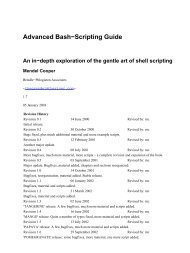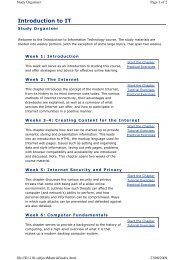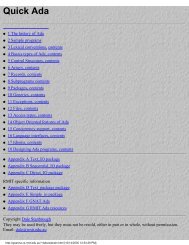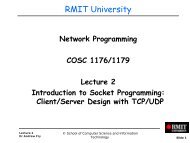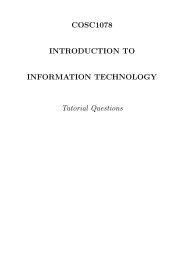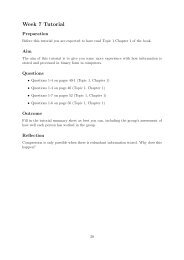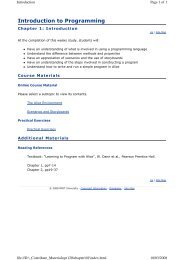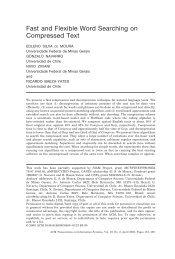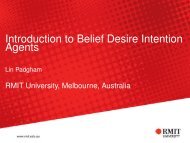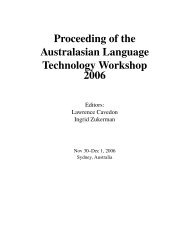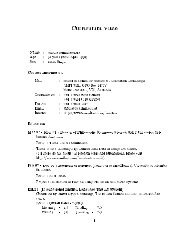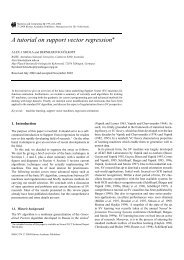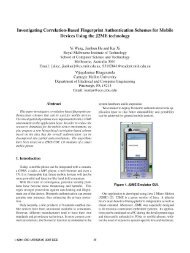The MBC information booklet - RMIT University
The MBC information booklet - RMIT University
The MBC information booklet - RMIT University
You also want an ePaper? Increase the reach of your titles
YUMPU automatically turns print PDFs into web optimized ePapers that Google loves.
Chapter 1: Introduction<br />
2<br />
Students who have not had an undergraduate computing background or have not done<br />
a complete computer science degree with a strong, hands-on practical orientation are<br />
advised to consider the Master of Technology (IT) (MC062) program. Similarly,<br />
students who have completed a computing qualification which is not also practically<br />
software development focused should consider an advanced version of the Master of<br />
Technology (IT) program.<br />
1.3 Prior Learning and Advanced Standing<br />
1.3.1 Honours<br />
Degrees<br />
1.3.2 Graduate<br />
Diplomas<br />
1.3.3 How to apply<br />
for Advanced<br />
Standing<br />
Applicants are expected to have completed<br />
• an undergraduate Computer Science degree, or<br />
• a Computer Science and Engineering degree, or<br />
• a software-oriented graduate diploma.<br />
Courses assume an excellent practical knowledge of C / Java programming in a Unix<br />
environment and familiarity with Object Oriented Principles. Students must achieve<br />
proficiency in these before commencing. Students may wish to undertake short courses<br />
or single courses from the Graduate Diploma in Software Development program prior to<br />
enrolling in the MAppSci (IT) program if they need a refresher/bridging program. See<br />
http://www.rmit.edu.au/csit/gd055.<br />
Advanced Standing is available for:<br />
1 students who have completed a recognised four year honours degree and<br />
2 some post-graduate diplomas.<br />
Advanced standing excludes Stage A and Stage B courses from the Graduate Diploma<br />
in Software Development program. See “Articulation, Exemptions and Advanced<br />
Standing” on page 72 for further details.<br />
Students will be credited for approved postgraduate level courses undertaken in the<br />
honours program.<br />
No credit for the Honours thesis is available. Students must undertake a new thesis and<br />
topic.<br />
In general, students who wish to complete their Masters degree in 1.5 years full time, or<br />
3 years part time would be advised to enrol in the Masters program directly rather than<br />
undertaking honours and then switching to Masters. Students who switch from honours<br />
to the Masters program will take at least 6 months full time longer to complete the<br />
Masters program.<br />
Advanced standing depends on the individual courses taken in the Graduate Diploma.<br />
Many Graduate Diplomas offer undergraduate level courses, and these will not be<br />
credited towards this Masters program. However, if the courses taken are at<br />
postgraduate level then students may see the Program Advisor for advanced standing.<br />
(See “Articulation, Exemptions and Advanced Standing” on page 72.)<br />
Students are advised that it is educationally and vocationally preferable to study a full<br />
complement of courses rather than seek exemptions, where possible.<br />
Students should make an appointment to see the program-coordinator after enrolment.<br />
Students should attend the appointment with:<br />
• an official transcript from the previous program, including syllabi and exams if<br />
possible, and<br />
• a single course exemption form, which is available from the Faculty Administration<br />
office on level 9 of Building 10.<br />
See “Articulation, Exemptions and Advanced Standing” on page 72.<br />
Advanced Standing will not be processed during enrolment. <strong>The</strong>re is no rush to process<br />
advanced standing, and this process can be completed in week 1 of a semester.



